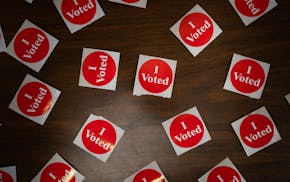Editor's note: The following article is part of a running series at Slate.com that describes American events using the tropes and tone normally employed by the American media to describe events in other countries.
WASHINGTON, United States — On Tuesday, voters in this country of 300 million, the world's second-largest democracy and most populous Christian nation, headed to the polls for elections to determine control of the upper house of the legislature and serve as a referendum on the country's embattled ruling regime.
While international monitors expected a mostly free and fair contest, questions have been raised about why the equivalent of the GDP of Montenegro was spent on a contest to determine the membership of a body expected to accomplish little over the next two years.
Human rights observers have also noted a troubling rise in anti-immigrant rhetoric stoked by far-right nationalist candidates.
President Barack Obama's ruling party was expected to lose seats, with the opposition's ability to take over the upper house determined by closely fought races in the nation's torrid southeastern swamps, central agricultural region and even in frigid Arctic villages thousands of miles from the capital.
There was no shortage of pressing issues, from a sluggish economic recovery to multiple foreign wars, facing this large and diverse society. Still, elections in this vast nation can often be characterized by idiosyncratic local rituals.
In this year's campaign season, feats of strength involving dominating animals have been popular. One opposition candidate for national office boasted of castrating pigs, another of wrestling alligators. While the country's citizens have migrated en masse to large cities in search of greater economic opportunity, specialists in American folkways say people here still value these demonstrations of rural aptitude.
Not to be outdone, government loyalists have boasted of their marksmanship and snowmobiling skills.
Appealing to nationalist sentiment, the opposition has accused the government of allowing too many immigrants to make their way across the country's southern border, tying this issue to fears of deadly viruses and terrorism. There have also been disturbing unconfirmed reports of a "war on women" being waged by religious extremists in the country's Western mountains.
In this deeply traditional society, where great import is accorded to family ties, powerful clans build patronage networks, and political office is often passed between relatives.
Remarkably, one race pitted the cousin of a former governor against the daughter of a former senator.
The election has been bitter, combative and expensive. In one coastal state, the ruling party and its supporters spent more than $26 million attacking a single opposition candidate. Not surprisingly, the election has also become a contest for influence among America's politically powerful oligarchs, who often seek to control elections by employing a complex form of legally sanctioned slush funds.
The vast fortunes spent and passions aroused are particularly noteworthy given that few expect the new legislature to pass much in the way of meaningful legislation. America is still governed under an unwieldy 18th-century political model employed by few other functioning democracies. With the executive mansion and legislature controlled by two different parties, there's little hope of large-scale reforms.
While 2014 has seen a rash of military coups, and while America boasts both a staggering level of income inequality and the world's most heavily armed populace, political forecasters say a violent uprising is still unlikely.
While few are satisfied with the political process as it exists, most Americans are either apathetic about the state of affairs or deeply invested in the current system. Most are already gearing up for the all-important presidential election coming in two years.
Not surprisingly, many expect it to be another brutal contest between the country's two top political dynasties.
Joshua Keating is a staff writer at Slate focusing on international news, social science and related topics. He was previously an editor at Foreign Policy magazine.

Gene therapy provision would make life-saving treatment more accessible and equitable

Minnesota bill would do more harm than good to kids' online safety

Readers Write: Gun control, Israel/Gaza war, Uber and Lyft drivers, Minneapolis

Counterpoint: Caucuses are the cornerstone of grass-roots democracy

